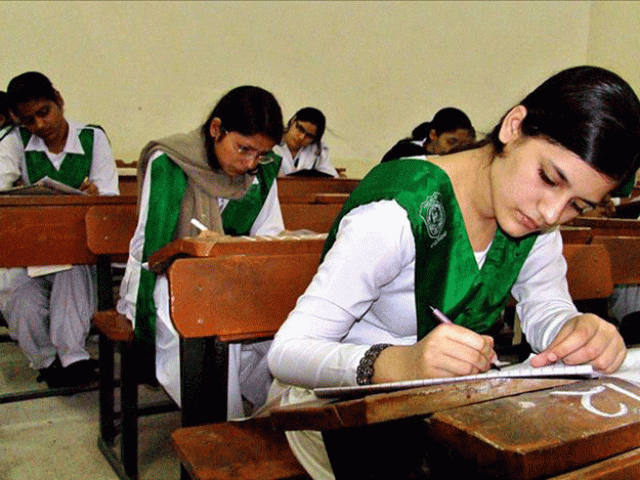A matter of prestige: The divide between public colleges
The concept of ‘desirable’ colleges has become ingrained within govt, say teachers

PHOTO: SEKHO
Think about the best public-sector college in the province and the name of Adamjee Government Science College comes to mind.
Each year, around 650 students with the highest Matriculation grades gain admission into this prestigious college; each year, over 90 per cent of them pass their exams with flying colours.
Compare this with another public college in Orangi Town. Here, only three students were enrolled last year — all three failed their exams.
Why is it that these two colleges, run by the same Directorate of College Education, produce such drastically different results every year?

"This divide [between 'prestigious' and 'third-rate' colleges] will continue to exist until the authorities abolish this very adjective of 'prestigious' attached to state-owned colleges," believes Prof Mirza Athar Hussain, a former teacher at Adamjee College, who has also taught at 18 other public colleges across Sindh. "Once this conceptual demarcation was made by society in the early 1980s, the government accepted it as fact and made no effort to lift its poorly performing colleges to the standards of better ones."
For Prof Hussain, the elite classes were equally to blame for fixating on this difference. "These colleges emerged as a new status symbol," he explains. "When a few students at a college secured positions a few times, every parent wanted their child to study at that particular institution."
As a result, he adds, the more resourceful parents used their financial positions to groom their children with the aim of getting them into what they thought were the best colleges. 'Tuition culture' emerged as a side-effect too, with many college teachers offering classes at centres even during college hours, giving rise to student and teacher absenteeism.
Institutions such as Adamjee College, DJ Sindh Government Science College, Begum Amna Majeed Malike PECHS Government College and St Joseph's Government College (which was returned to the Catholic Board of Education in 2005) rose to the top.
"Newspapers used to report how young students tried to commit suicide when they failed to secure admission into their dream college — such was the craze," recalls Prof Dr Salahuddin Sani, principal of Pakistan Shipowners' Government College in North Nazimabad.
Though this obsession subsided with the emergence of private examination boards and their affiliated institutions, the demarcation of the public colleges had become deeply ingrained by then.

"Even the answer scripts of students receive discriminatory assessment just because they are enrolled in first-, second- or third-rate colleges," admits Dr Muhammad Arshad, a teacher at DJ Science College. "The students at second- or third-rate colleges are considered less studious and hence eligible to receive fewer marks than those enrolled in a few good colleges, without looking at the content of their answers."
Prof Hussain agrees. "I taught my students with equal dedication everywhere," he says. "I didn't suddenly become a better teacher that most of my students at Adamjee [College] secured A1 grades. It is only natural that when a college's intake comprises the crème de la crème of Matriculation students, it will produce good results."
There is similar discrimination in the provincial education department and the Directorate of College Education; the relevant authorities have yet to implement its 'rationalisation plan,' introduced in 2011. This plan, according to provincial colleges' director-general Prof Dr Nasir Ansar, will analyse the needs of institutions that had been performing poorly due to a shortage of teachers, overcoming the problem by transferring excess teachers from other colleges.
Published in The Express Tribune, May 25th, 2015.



















COMMENTS
Comments are moderated and generally will be posted if they are on-topic and not abusive.
For more information, please see our Comments FAQ